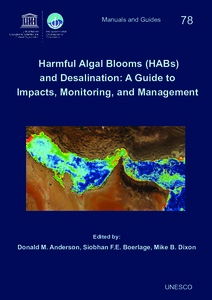Harmful Algal Blooms (HABs) and Desalination: a Guide to Impacts, Monitoring and Management.

View/
Average rating
votes
Date
2017Editor
Anderson, Donald M.
Boerlage, Siobhan F. E.
Dixon, Mike B.
Status
PublishedPages
539pp.
Metadata
Show full item recordAbstract
Arid countries throughout the world are heavily reliant on seawater desalination for their
supply of drinking and municipal water. The desalination industry is large and rapidly
growing, approaching more than 20,000 plants operating or contracted in greater than 150
countries worldwide and capacity projected to grow at a rate of 12% per year for the next
several decades (http://www.desaldata.com; 2016). Desalination plants are broadly
distributed worldwide, with a large and growing capacity in what will be referred to as the
“Gulf” region throughout this manual. Here the Gulf refers to the shallow body of water
bounded in the southwest by the Arabian Peninsula and Iran to the northeast. The Gulf is
linked with the Arabian Sea by the Strait of Hormuz and the Gulf of Oman to the east and
extends to the Shatt al-Arab river delta at its western end.
One of the operational challenges facing the industry is also expanding globally – the
phenomena termed harmful algal blooms or HAB.....
Publisher
Intergovernmental Oceanographic Commission of UNESCO,Paris, France
Series;Nr
Intergovernmental Oceangraphic Commission Manuals and Guides;78Document Language
enSustainable Development Goals (SDG)
14.A14.1
Essential Ocean Variables (EOV)
Phytoplankton biomass and diversityBest Practice Type
ManualCitation
Anderson, D. M.; Boerlage,S. F. E. and Dixon, M.B. (eds) (2017) Harmful Algal Blooms (HABs) and Desalination: a Guide to Impacts, Monitoring and Management. Paris, France, Intergovernmental Oceanographic Commission of UNESCO, 539 pp. (IOC Manuals and Guides No.78). DOI: http://dx.doi.org/10.25607/OBP-203Collections
 Repository of community practices in Ocean Research, Applications and Data/Information Management
Repository of community practices in Ocean Research, Applications and Data/Information Management